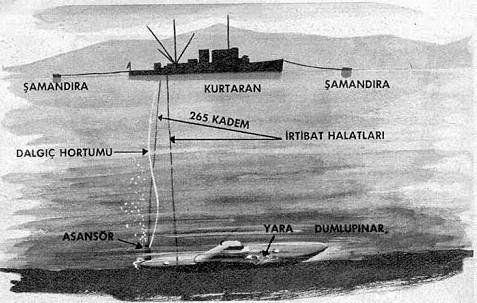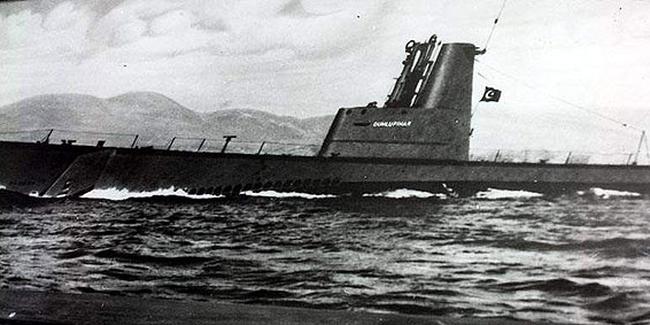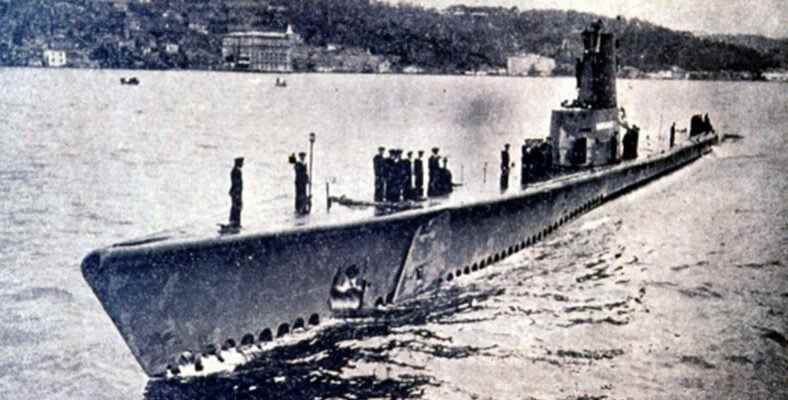Most of us are familiar with the song Ah Bir Ataş Ver. Just like other folk songs from Anatolia, this heartbreaking piece also has a story. The story of a tragedy with a sad ending, in which we lost our 81 lion sailors who were drowned by a submarine as a result of an accident…
The date was April 4, 1953. The weather conditions were bad, the fog could not be seen. It was raining, and the Dardanelles looked as if it knew what was about to happen. The Dumlupınar submarine, which aimed to dock at the port after its mission, was in the Bosphorus. It collided with the Swedish-flagged Nabuland freighter, which was transiting at the same time. Everything started after that.
There were 81 crew members on the Dumlupınar submarine. Two of our 8 lion sailors on board unfortunately died by being stuck on the propeller, and one drowned. Only 5 of those on board were able to throw themselves into the water. 22 of the crew inside managed to take shelter in the torpedo compartment.
The soldiers, who entered the torpedo with the news of what would happen to them, threw a buoy on the sea surface. Dumlupınar was dragged into the depths of the strait because of the blow he received in the accident. The buoy, which was launched to the surface, contained a telephone cable, through which they called for help as it sank.
The coast guard teams and the rescue team in the command took the call and contacted the people trapped in the submarine. The authorities’ first warning to stranded seafarers was to use the oxygen in the cabin sparingly. Soldiers were told not to speak, sing folk songs and smoke unless necessary. The longer they lingered there, the more likely they were to survive.
All possibilities were struggling, and ways were sought to save the soldiers who were buried in the deep waters of the Bosphorus. The 22 soldiers inside the torpedo waited helplessly:

From time to time, the authorities would reach the soldiers, telling them that they were working upstairs, to keep their fortitude. 25 hours had passed when the rescue ship, which arrived at the wreck site 12 hours after the incident, reached Dumlupınar with the equipment. The soldiers had been stranded at the bottom of the sea in a tiny room for more than a day. The conversation of the Dumlupınar submarine with the surface took place as follows:
– Hello… Dumlu?
– Yeah… Dumb.
– Sir, the weather has gotten a little bad.
– Don’t get discouraged. That air is enough for you for 2 more days. You put the kids to bed. Do not smoke.
– No, sir, they’re all sleeping. We don’t smoke either. There is no light either. We are in the dark.
– Do not use the need lamps, they will be needed in the future.
– We don’t use it anyway. Someone’s light is too weak.
As time passed, the soldiers, who lost their hope, began to understand this from the long wait. For them, there were things more painful than living knowing that he was going to die soon. The feeling of not being able to say goodbye to their loved ones for the last time started to consume the hopes of 22 brave men. Bad weather conditions made it very difficult for the divers to dive, throwing the divers left and right. Eleven dives were made, but none yielded any results. Work on the surface was inconclusive. The wild current, depth, weather conditions and technological inadequacy in the Bosphorus made Dumlupınar inaccessible.
When it became clear that all means of escape were inaccessible and impossible, it was stated to the soldiers that they would be able to speak freely, sing folk songs and smoke. One of the soldiers asked his commander a heartbreaking question:
“That’s all, Commander, shall we light a cigarette?”
Half an hour after the last speech, an attempt was made to contact the submarine again, but the only thing heard was the folk song that the soldiers sang in unison.
The Ministry of National Defense announced on April 7 that it had stopped the rescue efforts, which lasted for three days, and that all hopes were lost.
66 Years of History
Among the five survivors, Seyir Senior Staff Sergeant Hüseyin flow describes those moments as follows:
“Suddenly, water started pouring in from the hood. The water took the two soldiers to the sea. I held the anchor of the exit ladder with my left hand. It was like my arm was going to break, this time I held it with both hands. When the inside of the ship was full of water, it was as if someone said to me, ‘Come on, go’. “The water had completely filled in. I was trying to get out of the water. I felt the feeling of coming out again as if to say ‘let’s walk’. I hit my head on the hood of the ship for a while. After getting out of the ship, there was a 90-centimeter sea wave.”
Telling the story of his rescue after the accident, Hüseyin Akin recounted the event as follows when he looked back 66 years:
“I took off my shoes so that they wouldn’t weigh me down. I started crying because of the fear that a shark would bite my foot. I shouted ‘Help, help’ to the ship that collided with us. They put a boat down. One person could not get me from the sea, another person came. They took me to their ship. They took me to their ship. “When I got on board, I looked at the water. The propellers of the submarine were completely above the water. 5 minutes passed, it disappeared in the water.”

Sometimes words carry such pain that you cannot describe them even if you explain them for pages. Today, we talked about our Dumlupınar heroes as much as we could. That tiny room they entered to hold on to life did not become a grave for only those 22 young soldiers.
The heart of a whole country continues to beat in the Dardanelles Strait, where our grandfathers lay together with our martyrs.
